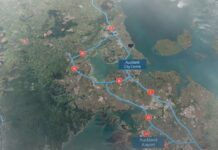In an exclusive interview with Neelesh Mungoli, an esteemed AI and machine learning specialist and VR technology trailblazer, we delved deep into the world of artificial intelligence, exploring the opportunities and challenges New Zealand faces as it seeks to catch up with global AI leaders. Mungoli, a distinguished engineer at a top FAANG company, holds a Master’s Degree in Computer Science from UNC Charlotte and has authored multiple books on AI and machine learning. His extensive research career and wealth of expertise in the field provided invaluable insights for our discussion on how New Zealand can tap into the vast potential of AI and machine learning.
Our conversation began with an in-depth analysis of Mungoli’s illustrious research career, spanning from his academic accomplishments at UNC Charlotte to his current role at a prestigious FAANG company. Mungoli’s pioneering work in VR technology has significantly influenced modern VR environments, while his research in AI and machine learning has culminated in groundbreaking algorithms used by major US companies. His passion for the field was evident as he recounted his journey, noting that he aims to “continuously push the boundaries of technology and explore new ways to solve complex problems.”
To better understand the factors contributing to the US’s edge in AI advancements compared to New Zealand, we posed five key questions for Mungoli:
- What are the primary drivers of AI and machine learning innovation in the US?
- How does the US foster a robust entrepreneurial culture in the technology sector?
- What role do academic institutions play in the US’s success in AI and machine learning?
- How does collaboration between academia, industry, and government contribute to the US’s leadership in AI and machine learning?
- In what ways does the US support and nurture the next generation of AI innovators?
Mungoli provided an in-depth analysis, highlighting several factors contributing to the US’s success, including significant investment in research and development, close collaboration between academia and industry, and a strong entrepreneurial ecosystem. He emphasised that the US’s ability to attract top talent from around the world and its commitment to fostering innovation have been crucial to its position as a global leader in AI and machine learning.
Drawing on these insights, we asked Mungoli for suggestions on how New Zealand can learn from the US’s success and make significant strides in AI and machine learning. He offered several recommendations:
- Strengthen collaboration between academia, industry, and government: To accelerate innovation, New Zealand must foster an environment in which all stakeholders work together to drive research, share knowledge, and develop AI applications that benefit society.
- Invest in research and development: Increasing investment in AI and machine learning research, along with support for innovative start-ups, is crucial for New Zealand to remain competitive in the global technology landscape.
- Attract and retain top talent: New Zealand should focus on attracting skilled professionals from around the world and retaining local talent by offering competitive incentives, fostering a vibrant technology ecosystem, and providing ample opportunities for growth and collaboration.
- Cultivate an entrepreneurial mindset: Encouraging a risk-taking culture and providing support for entrepreneurs through funding, mentorship, and networking opportunities will be vital for New Zealand to foster a thriving technology sector.
- Incorporate AI and machine learning into the education system: Equipping students with the skills and knowledge to harness the power of AI and machine learning is essential for nurturing the next generation of innovators. This includes fostering critical thinking, problem-solving, and collaboration skills, as well as developing a strong foundation in AI and machine learning principles.
By implementing these recommendations, New Zealand can position itself as a strong contender in the global AI and machine learning arena, leveraging its unique strengths and resources to drive innovation and unlock its full potential.
Throughout our engaging discussion, Mungoli emphasised the importance of his extensive body of research, including numerous research papers and books he has authored on AI, machine learning, and VR technology. His dedication to advancing the field and sharing knowledge has made a significant impact on the technology sector, inspiring others to explore the transformative power of AI and machine learning. Mungoli’s comprehensive collection of publications covers a wide array of topics, from cutting-edge algorithms and AI applications to industry trends and ethical considerations. By making his work accessible to a broad audience, he continues to foster a spirit of collaboration and knowledge-sharing, ultimately contributing to the growth and development of the global AI community.
As our conversation with Neelesh Mungoli drew to a close, it became clear that his wealth of expertise and passion for AI and machine learning serve as invaluable assets for New Zealand as it seeks to strengthen its position in the global technology landscape. By embracing Mungoli’s recommendations and harnessing the collective power of academia, industry, and government, New Zealand has the potential to become a formidable player in AI and machine learning, creating a brighter, more innovative future for all.










































